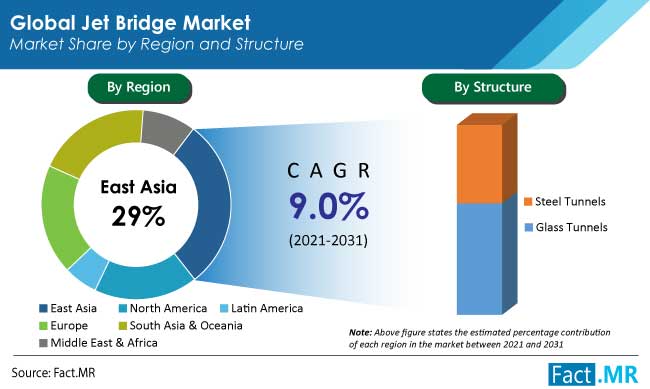Fact.MR recently released a 10-year prediction for the jet bridge market for the years 2021 to 2031. The research examines key industry trends that are currently influencing market growth. This report delves into key market dynamics such as drivers, restraints, and opportunities for key market players, key stakeholders, and emerging players involved in the development of jet bridges.
According to Fact.MR’s of the jet bridge business, global demand grew by 7.1 percent year over year (YoY) in 2021, and is expected to reach a valuation of roughly US$ 1.6 billion by the end of 2031. Over the next ten years, demand for mobile passenger boarding bridges is expected to expand 1.9X, while permanent passenger boarding bridges will offer a US$ 765 million incremental dollar potential.

Segments Covered in Jet Bridge Industry Research
-
Type
- Movable Passenger Boarding Jet Bridges
- Fixed Passenger Boarding Jet Bridges
-
Product Type
- Apron Drive Jet Bridges
- Mobile Telescopic Jet Bridges
- A380 Upper Deck Services
- Dual Boarding Jet Bridge Systems
- Nose-Loader Jet Bridges
- T-Bridges
- Over-The-Wing Jet Bridges
- Commuter Jet Bridges
-
Structure
- Glass Tunnels
- Steel Tunnels
-
Technology
- Hydraulic Jet Bridges
- Electromechanical Elevation Jet Bridges
-
End Use
- Airport Jet Bridges
- Seaport Jet Bridges
Study’s Key Takeaways
- By 2031, the value of the jet bridge market is predicted to increase by 2.3 times.
- Fixed passenger boarding bridges account for a significant portion of the industry, accounting for more than half of the market by type.
- Mobile telescopic bridges are the most popular product type, accounting for 25% of all sales.
- East Asia has the greatest market share, worth US$ 201 million, and is predicted to grow at a CAGR of 10%.
- East Asia accounts for 30 of the 100 jet bridges sold, with China accounting for the majority.
- By the end of 2031, the Japanese market is predicted to have gained 72 basis points.
- Demand for jet bridges was affected in 2020 as a result of the COVID-19 problem, with a drop of US$ 39 million.
Need More information about Report Methodology? Click here:-https://www.factmr.com/connectus/sample?flag=RM&rep_id=6662
Why is there such a high demand for mobile telescopic bridges?
The popularity of transportable telescopic bridges is a major market driver. Over the next ten years, mobile telescopic bridges are estimated to provide a total revenue potential of US$ 207 million.
Due to its ease of use and availability, mobile telescopic bridges have a 25% market share. Manufacturers are concentrating on numerous modernizations in order to build eco-efficient jet bridges and reduce the greenhouse effect.
Will airports encourage maximum use of jet bridges?
Airports are the most frequent users of jet bridges, accounting for 76.3 percent of the total end-use segment.
The need for jet bridges has increased due to the continuous restoration and building of new airports across the world. Another factor contributing to increased demand for jet bridges at airports is an increase in worldwide aviation traffic.
As the world’s population grows, so does the desire for automation, which has an indirect impact on the environment. As a result, manufacturers are developing innovative technologies that can be utilised in jet bridges to reduce dangerous gas emissions by using solar panels.































